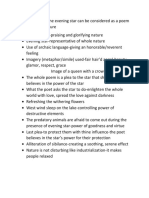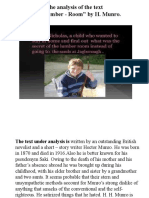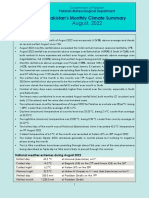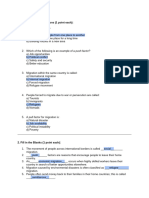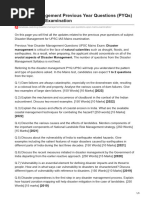Wave
Wave
Uploaded by
Nethmi RanasingheCopyright:
Wave
Wave
Uploaded by
Nethmi RanasingheCopyright
Share this document
Did you find this document useful?
Is this content inappropriate?
Copyright:
Wave
Wave
Uploaded by
Nethmi RanasingheCopyright:
Wave
By Sonali Deraniyagala.
"The Wave" by Sonali Deraniyagala is a poignant memoir that delves into the devastating impact of the
2004 Indian Ocean tsunami on the author's life. Deraniyagala's compelling narrative weaves through
grief, survival, and the long journey towards acceptance.
The narrative opens with the author's recollection of the idyllic family vacation in Sri Lanka before the
tsunami struck. Deraniyagala provides vivid descriptions of the serene surroundings, creating a stark
contrast to the chaos that ensues. The suddenness of the disaster is palpable, capturing the raw
emotions of loss and disbelief.
One of the strengths of Deraniyagala's writing lies in her ability to convey the visceral nature of grief. The
author grapples with survivor's guilt as she contemplates the loss of her entire family – husband,
children, and parents. The overwhelming sorrow is depicted with such intensity that it resonates deeply
with readers, evoking empathy for her unimaginable pain.
The memoir also explores the aftermath of the tsunami, both in terms of physical and emotional
wreckage. Deraniyagala vividly portrays the challenges of rebuilding a shattered life, highlighting the
complexities of grief that extend far beyond the immediate aftermath of the disaster. The author's
journey through therapy and her encounters with well-meaning friends add layers to the narrative,
illustrating the often awkward dance between those who have experienced profound loss and those
trying to offer support.
Deraniyagala's exploration of memory is another compelling aspect of the memoir. The author grapples
with the selective nature of recollection, acknowledging the fragility of human memory, especially in the
face of trauma. This introspective approach adds depth to the narrative, inviting readers to contemplate
the nature of resilience and the ways in which individuals reconstruct their identities after profound loss.
The theme of identity is central to "The Wave." Deraniyagala's struggle to redefine herself in the absence
of her family is a recurrent motif throughout the memoir. The author's candid exploration of her evolving
self-perception adds a layer of complexity to the narrative, portraying the resilience of the human spirit
in the face of profound tragedy.
The memoir also serves as a poignant reflection on the impermanence of life and the unpredictability of
fate. Deraniyagala's journey becomes a universal exploration of the human condition, prompting readers
to confront their own vulnerabilities and appreciate the fleeting nature of existence.
The writing style of "The Wave" is both evocative and reflective. Deraniyagala employs vivid imagery and
introspective prose to convey the emotional landscape of her experience. The memoir's structure,
moving between past and present, adds a dynamic element to the narrative, allowing readers to witness
the author's transformation over time.
In conclusion, "The Wave" by Sonali Deraniyagala is a powerful and emotionally charged memoir that
navigates the complexities of grief, survival, and self-discovery. Through a deeply personal lens,
Deraniyagala invites readers into the heart of her tragedy, creating a narrative that resonates with
universal themes of loss and resilience. The memoir stands as a testament to the indomitable human
spirit and the capacity for healing even in the face of unimaginable sorrow.
You might also like
- Twilight of A Crane NoteDocument7 pagesTwilight of A Crane NoteTharushka Dinujaya90% (10)
- Vendor of Sweets: R.K. NarayanDocument8 pagesVendor of Sweets: R.K. NarayanHajar Inam100% (4)
- Summaries of All Three Novels PresentationDocument65 pagesSummaries of All Three Novels PresentationDinidu Nisal100% (1)
- The EagleDocument6 pagesThe EagleGAMAGE SARANAPALA67% (3)
- Literature Exam Papers For Grade 10Document8 pagesLiterature Exam Papers For Grade 10Rasbahan Manshaf50% (2)
- Big Match QuestionsDocument1 pageBig Match Questionssudeepa pathirana100% (1)
- Twilight of A Crane Drama AnalysisDocument8 pagesTwilight of A Crane Drama AnalysisLuchithaNo ratings yet
- The Novel BringingDocument2 pagesThe Novel BringingUpul Kumarasinghe67% (3)
- Tradition and Modernity in RDocument13 pagesTradition and Modernity in RFarha Ahmed100% (4)
- DRRR - Q1 - Week 1Document7 pagesDRRR - Q1 - Week 1Shekaina Faith Cuizon Lozada100% (2)
- WaveDocument2 pagesWavemoses bandick100% (1)
- Lahore AttackDocument3 pagesLahore AttackThihansa Dewnethmi100% (1)
- Past Paper Question For Appreciation of English LiteratureDocument16 pagesPast Paper Question For Appreciation of English LiteratureAafiya Yasir100% (1)
- Farewell To Barn and Stack and TreeDocument5 pagesFarewell To Barn and Stack and TreeSanuli Sehasna100% (5)
- An Extract From Wave' - A Memoir of Life After The TsunamiDocument44 pagesAn Extract From Wave' - A Memoir of Life After The Tsunamiantonybabi86No ratings yet
- Twilight of A Crane Drama AnalysisDocument8 pagesTwilight of A Crane Drama Analysisazeemzahira111100% (2)
- Analysis of To The NileDocument17 pagesAnalysis of To The NileRohana C. Fernando80% (5)
- To The Nile - ThemesDocument4 pagesTo The Nile - ThemesNoël Perera67% (3)
- Worksheet On The Eagle by Alfred Lord TennysonDocument1 pageWorksheet On The Eagle by Alfred Lord Tennysonmoses bandick100% (2)
- Examine How To The Evening Star Can Be Considered As A Poem Which GlorifiesDocument1 pageExamine How To The Evening Star Can Be Considered As A Poem Which GlorifiesCHETHANI RAMEESHA100% (2)
- An Appreciation - To The NileDocument2 pagesAn Appreciation - To The NileNoël PereraNo ratings yet
- Grade 10 Appreciation of English Literary Texts 2nd Term Test Paper With Answers 2019 English Medium North Central ProvinceDocument8 pagesGrade 10 Appreciation of English Literary Texts 2nd Term Test Paper With Answers 2019 English Medium North Central ProvinceRebekah Grace0% (1)
- Big Match 1983 - Yasmine Goonaratne (A Criticism)Document13 pagesBig Match 1983 - Yasmine Goonaratne (A Criticism)Rathnapala Subasinghe95% (19)
- Answers - DramaDocument2 pagesAnswers - DramaNiranjanie Thanuja GinigeNo ratings yet
- Vendor of Sweets ThemesDocument3 pagesVendor of Sweets ThemesEver DeenNo ratings yet
- The Twilligt of A Crane (VM)Document52 pagesThe Twilligt of A Crane (VM)Master DewNo ratings yet
- Essay Type Question 1 - To The NileDocument2 pagesEssay Type Question 1 - To The NileNoël Perera100% (5)
- Comment On The Father-Son Conflict in Vendor of SweetsDocument2 pagesComment On The Father-Son Conflict in Vendor of SweetsJakob Wüthrich100% (3)
- Lesson Notes PoemsDocument3 pagesLesson Notes PoemsShazeen Shab100% (2)
- Breakfast by Jacques PrevertDocument2 pagesBreakfast by Jacques PrevertNethmi Ranasinghe100% (6)
- Short Summary ofDocument10 pagesShort Summary ofkannan100% (1)
- To The Evening Star Poem AnalysisDocument21 pagesTo The Evening Star Poem AnalysisMaster Dew100% (1)
- The Lumber Room (Highlighted)Document5 pagesThe Lumber Room (Highlighted)Rameshkumar Nivarshana100% (2)
- Papers - LK: Answer Question 1 and Four Others Selecting Two From Each Section Poetry and ProseDocument2 pagesPapers - LK: Answer Question 1 and Four Others Selecting Two From Each Section Poetry and ProseHajar Inam100% (1)
- To The Evening StarDocument4 pagesTo The Evening Starsudeepa pathirana100% (5)
- Worksheet: To The Nile by John KeatsDocument7 pagesWorksheet: To The Nile by John Keatshamlet in the tea cup83% (6)
- Upside DownDocument16 pagesUpside Downsai kishore100% (2)
- Fear Gabriela Mistral Lesson ResourcesDocument5 pagesFear Gabriela Mistral Lesson ResourceskassivanesanNo ratings yet
- The Bear by Anton Chekov Model AnswerDocument2 pagesThe Bear by Anton Chekov Model Answermsj aasi80% (10)
- The Lahore AttackDocument3 pagesThe Lahore AttackLuchitha75% (4)
- Vendor of SweetsDocument2 pagesVendor of SweetsUpul KumarasingheNo ratings yet
- English Literature: 2 Term Lessons - 2020 Grade - 11 Worksheet - 09 Classes: Grade - 11-A & B of June, 2020Document2 pagesEnglish Literature: 2 Term Lessons - 2020 Grade - 11 Worksheet - 09 Classes: Grade - 11-A & B of June, 2020Luchitha50% (2)
- Grade 10 English LiteratureDocument3 pagesGrade 10 English LiteratureAzmy100% (4)
- Essays - The Lumber Room by SakiDocument6 pagesEssays - The Lumber Room by Sakikushantha1973No ratings yet
- Literature Kalutara District 2019 Past PaperDocument4 pagesLiterature Kalutara District 2019 Past PaperGAMAGE SARANAPALANo ratings yet
- Twilight of A Crane Drama AnalysisDocument10 pagesTwilight of A Crane Drama AnalysisThusitha AriyaratneNo ratings yet
- Eg11 - T2 - Lit - 2018 - PI IIDocument4 pagesEg11 - T2 - Lit - 2018 - PI IISuvindu NimasaraNo ratings yet
- Royal College Term Test Papers 2020 LiteraryDocument4 pagesRoyal College Term Test Papers 2020 LiteraryGAMAGE SARANAPALANo ratings yet
- The EagleDocument4 pagesThe EagleJunko0% (1)
- THE HUNTSMAN - Critical Appreciation of The PoemDocument2 pagesTHE HUNTSMAN - Critical Appreciation of The PoemTukTukDude100% (3)
- The Analysis of The Text "The Lumber - Room" by H. MunroDocument20 pagesThe Analysis of The Text "The Lumber - Room" by H. MunroAizat TemirbaevaNo ratings yet
- Appreciation of English Literary Texts Grade 10 - Model PaperDocument5 pagesAppreciation of English Literary Texts Grade 10 - Model PaperBatuka Mary100% (1)
- Evening StarDocument6 pagesEvening Starhaziqhazri70% (10)
- Poem Explanation - To The NileDocument5 pagesPoem Explanation - To The NileNoël Perera100% (1)
- An Analysis of The Poem Upside Down-1Document1 pageAn Analysis of The Poem Upside Down-1Cavi ThanNo ratings yet
- Lit Analysis PDFDocument7 pagesLit Analysis PDFvinu100% (2)
- Grade 10 & 11 (New Syllabus) : Appreciation of English Literary TextsDocument17 pagesGrade 10 & 11 (New Syllabus) : Appreciation of English Literary Textsmatara engineering100% (3)
- "The Eagle" by Alfred, Lord TennysonDocument5 pages"The Eagle" by Alfred, Lord TennysonVersoza Nel100% (1)
- Wave QuestionDocument2 pagesWave Questionjonylakshayan15No ratings yet
- GRIEFDocument16 pagesGRIEFLynet Beverly MachakwaNo ratings yet
- Disaster Prediction:: - Predicting Natural DisastersDocument19 pagesDisaster Prediction:: - Predicting Natural DisastersMike SyNo ratings yet
- 3 EarthquakesDocument21 pages3 EarthquakespawiiNo ratings yet
- 2.12 ICS Forms ICS 208Document2 pages2.12 ICS Forms ICS 208mdrrmo sinaitNo ratings yet
- Project Overview - 1Document7 pagesProject Overview - 1Jaymark SorianoNo ratings yet
- Memorandum 4427Document4 pagesMemorandum 4427Anonymous 3FRYaHDNo ratings yet
- Piece Speech ChoirDocument3 pagesPiece Speech Choirjaspher manaolNo ratings yet
- DISASTER READINESS AND RISK REDUCTION Week 1Document34 pagesDISASTER READINESS AND RISK REDUCTION Week 1ayesha iris matillaNo ratings yet
- Disaster Management of LandslidesDocument14 pagesDisaster Management of LandslidesVinayakNo ratings yet
- Pakistan Monthly Climate Summary August 2022Document8 pagesPakistan Monthly Climate Summary August 2022Hannan yusuf KhanNo ratings yet
- Job The Victim of His People 9781503622999Document170 pagesJob The Victim of His People 9781503622999fabriciodja98No ratings yet
- Investigating Pompeii and Vesuvius: Delta - Truth or Myth?Document2 pagesInvestigating Pompeii and Vesuvius: Delta - Truth or Myth?Silvia Dewi AritonangNo ratings yet
- Strategy Note Risk Management Frameworks Mar 2021 PDFDocument21 pagesStrategy Note Risk Management Frameworks Mar 2021 PDFLABED AbdelhamidNo ratings yet
- Extra Reading Practice 2Document3 pagesExtra Reading Practice 2Hoang Trung Tin (K18 HCM)No ratings yet
- Ex 2.01 Human Error Chain in An AccidentDocument5 pagesEx 2.01 Human Error Chain in An AccidentAndrejSukoraNo ratings yet
- Last Voyage of The S.S.clan AlpineDocument4 pagesLast Voyage of The S.S.clan AlpineSuman JamesNo ratings yet
- Hazard Assessment ReportDocument6 pagesHazard Assessment ReportalramosNo ratings yet
- Environment & Disaster 2021Document14 pagesEnvironment & Disaster 2021Anil BhatiaNo ratings yet
- Migration QuizDocument4 pagesMigration QuizyasmineamezaneNo ratings yet
- DRRR11 Q1 Mod3Document12 pagesDRRR11 Q1 Mod3Lany T. Catamin83% (6)
- Christina Action - Plan - and - Research - NotesDocument6 pagesChristina Action - Plan - and - Research - NotesChristina LiuNo ratings yet
- Pink and Purple University Tips PresentationDocument20 pagesPink and Purple University Tips Presentationkenneth.fuentiblancaNo ratings yet
- Project Proposal For Values EdDocument2 pagesProject Proposal For Values EdKarl John Del Carmen100% (1)
- Disaster Management QA - Docx SignedDocument8 pagesDisaster Management QA - Docx SignedSrijaJuluruNo ratings yet
- Justin Elle D. Pelpinosas Eapp Critical Approaches in Writing A CritiqueDocument2 pagesJustin Elle D. Pelpinosas Eapp Critical Approaches in Writing A CritiqueJustin Elle PelpinosasNo ratings yet
- 18Y1344 E DVI - GuideDocument31 pages18Y1344 E DVI - GuidepinkeusarangNo ratings yet
- Disaster Management PyqDocument3 pagesDisaster Management Pyqhslife585No ratings yet
- Disaster Risk Readiness and Reduction Module 9 - The Elements of Fire Triangle What'S inDocument4 pagesDisaster Risk Readiness and Reduction Module 9 - The Elements of Fire Triangle What'S inKimchiiNo ratings yet
- Forensic Accounting and Complex Claims Facc All ServicesDocument10 pagesForensic Accounting and Complex Claims Facc All ServicesEduardo CanedoNo ratings yet
- NSTP CWTS 1 Module 11Document3 pagesNSTP CWTS 1 Module 11Niña Edrienne JuntillaNo ratings yet



















